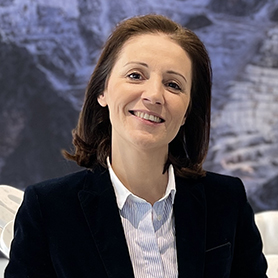Evrim Urcum: True Value Requires Long-Term Thinking
With over 20 years of experience, Evrim Urcum, Head of Sustainability, Region Europe at Omya International AG, is passionate about the need to adapt business strategy to the natural environment and explains why true value requires long-term thinking.


Evrim Urcum
Head of Sustainability, Region Europe, Omya International AG
"Sustainability has helped me to see that a company is a living organism. There are lines of nerves between all functions, processes, and people. Strong ones, weak ones, exactly how it is in nature."
– Evrim Urcum, Head of Sustainability, Region Europe, Omya International AG
Q.
How has your understanding of sustainability influenced your journey and current role?
Sustainability is a very popular term today, but when I started working in sustainability in 2008 it was really hard to explain what it was about. I first discovered the term when I was trying to connect the dots in the company around business processes, quality, environment, health and safety, as well as what was going in outside world. I really enjoyed, and still enjoy, exploring what sustainability actually means. I now see that being the generation to create the actual meaning and definition within the company is a privilege. Sustainability has helped me to see that a company is a living organism. There are lines of nerves between all functions, processes, and people. Strong ones, weak ones, exactly how it is in nature. In today’s world, you need to be flexible and agile in the business. If nerves and connections are strong enough, you can deal with anything.
Q.
What role does company culture and good leadership play in creating sustainable value?
Leadership is by itself a talent to drive people and business in the right direction, so I don’t think it’s useful to use the term ’good leadership.’ I feel so lucky to work with leaders who have always been ahead of their time. For me, leadership means being real and sincere in creating sustainable value.
It’s about caring, and it starts with human beings and an appreciation that our existence depends on our environment, community and whoever we are in contact with. When a leader really cares, everyone pays attention and wants to be part of it. Believing and being the role model creates the difference. We are living in a value driven environment. Our values at Omya are integrity, perseverance, modesty and courtesy. These have been handed down for 138 years via just five CEO’s, which makes the message very strong. They are not a set of rules, they are part of our DNA and when you think about it, they are human values that in their simplest form are a desire to do a good job and do the right thing.
Q.
Living and working in Switzerland, you are at the heart of innovation. How do you think innovation is creating more sustainable business practices?
I feel privileged to work in such an innovation driven company, striving to find sustainable solutions for industry and communities. Everyday our natural products are contributing to the sustainability of the world, creating added value for human beings and the environment. Expanding beyond our core industrial markets mainly in paper, construction and polymers, our natural minerals are now found in all areas of everyday life such as pharmaceuticals, food and feed, plant nutrition, wastewater and drinking water treatments. I am very proud that we are listed among the top 20 innovative companies in Switzerland with 210 patent applications, 39% of all are touching UN Sustainable Developments Goals. There are three pillars that drive a sustainable business: responsible use of natural resources, decreasing carbon emissions and creating positive value. Innovation is already in the heart of those three pillars.
Q.
What impact do other roles such as safety and operational risk management and operations excellence have in helping to create a sustainable business?
There’s no doubt that they’re all connected and it’s the same sentiment of doing the right thing for the people, planet and sustainable business. Being sustainable in the business depends on internal processes, quality and healthy interaction of those, as well as a healthy interaction with the outside world, stakeholders and environment. Sustainable business can only be achieved when we all work together, governments, industries and communities, to contribute to sustainable future.
"Sustainability is not about the absence of negative but presence of positives."
– Evrim Urcum, Head of Sustainability, Region Europe, Omya International AG
Q.
What do you consider to be the main challenges in planning for a more sustainable future?
Long term thinking is key in our business. In a company with long history, it is very interesting to witness the results of actions and how they have contributed to our sustainable business today. The real benefits of these actions will not be seen in the short-term, it will take years. We can only observe today how well we are integrating our activities into the current environment. Creating real value may take time, and the work I am doing today will benefit the next generation. My motivation is doing the right thing where I can contribute first of all personally, as well as in my work.
Q.
You mentioned the three main pillars that drive the sustainable business, are there other key drivers that create a sustainable business?
A key driver that is embedded in each of the pillars is to keep learning. The world is changing so fast and we need to stay on track, but not become complacent that we think we know enough. We can very quickly become out-of-date. The other embedded driver is the desire to create positive value. Decreasing the negative impact cannot be as successful alone, we need to put focus on positive value creation at the same time. Sustainability is not about the absence of negative but presence of positives.
"In life, you may first need to know where you want to reach. Long term vision is key but still not enough. It’s our actions and small steps that will take us there."
– Evrim Urcum, Head of Sustainability, Region Europe, Omya International AG
Q.
What is your top tip for other women looking to succeed in sustainability roles?
In life, you may first need to know where you want to reach. Long term vision is key but still not enough. It’s our actions and small steps that will take us there. Working in sustainability is the same. Thinking and dreaming are important, but we need to step further with actions. I am currently learning to ski and when I’m on a steep slope I just want to cry, but I stay focused on the first turn. It’s the same in life, don’t forget where you want to go, but just focus on the first step, do it to the best of your ability and then make the next move, and it will all link together in the end. Never give up just because you fall, keep going. Hopefully, my skiing will be the same!